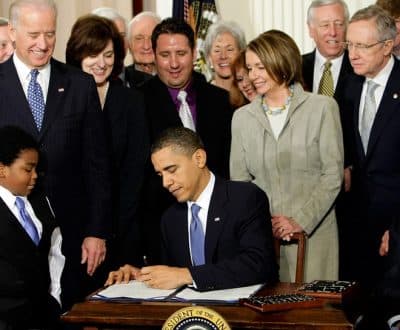Advertisement
No, Obamacare Doesn't 'Start' Oct. 1, But Here's What Changes

By Georgia Feuer
Guest contributor
“I heard the ACA is starting October 1st,” an acquaintance mentioned the other day.
I was confused. The Affordable Care Act — better known as Obamacare — is a massive law with wide-ranging effects all throughout the health-care system and many, many start dates; in fact, 65 start dates have already passed. They include the start date for letting young adults up to age 26 stay on their parents' insurance; for progress towards closing the Medicare drug coverage gap; and for money to explore health care delivery reform through creation of the Center for Medicare and Medicaid Innovation.
So what was she referring to when she said “the ACA is starting Oct. 1st”?
When I google “Obamacare”, it becomes clear that right now, the word is synonymous with just one aspect of the health care act, the section that calls for the creation of health insurance exchanges. Oct. 1, 2013, marks the opening of these health insurance exchanges; marketplaces where John Q. Public can shop for and enroll in a health insurance plan that will provide coverage as of Jan. 1, 2014. He cannot be denied coverage and the amount that he pays for this coverage cannot be influenced by his current health status (although he can be charged more if he is a smoker).
(You may also want to check out today's Here and Now which answers many questions about Obamacare.)

Every state will have its own exchange, which may be run by a state agency or a federal agency, but in some states, information about the exchange can be hard to come by. The reason: controversy over Obamacare is abundant, and one tactic used to derail Obamacare involves preventing people from hearing about how the law might positively affect them.
A USA Today story about Oklahoma Republicans resisting efforts to help people navigate the new exchanges also helps to explain why ignorance about aspects of the law remains so high. For example, only 49% of people polled in a recent survey knew that federal subsidies will be available to help low-income residents buy health insurance5.
Alongside the opening of the exchanges comes the option for more people to enroll in Medicaid. However, many states have not opted into the Medicaid expansion, despite evidence that the expansion is in a state's financial best interest. One of the consequences of not expanding Medicaid is a cost gap, depicted below, that I refer to as the “Sorry, you aren't making enough money to qualify for assistance” conundrum:

Here in Massachusetts, we've already had a health insurance exchange for some time: over six years, in fact. So what does Oct. 1 mean for us?
There are changes coming to our exchange, called the Health Connector, such as...dental plans! Starting Oct. 1st, consumers will be able to select from a variety of dental plans to supplement health insurance. Another new benefit is that people with incomes at 300-400% of the federal poverty level, who previously did not qualify for assistance, will now have access to a health insurance subsidy, which will be seamlessly applied when enrolling through the Health Connector. Four hundred percent of the federal poverty level means a yearly income of about $46,000 for an individual.
Massachusetts is getting more money from the federal government to fund MassHealth and health insurance subsidies. In order to incorporate this money, the Health Connector is going through a reshuffling, changing the names of programs and implementing a new website that will direct visitors to the plans that they are eligible for.
Unfortunately, this means that about 150,000 current enrollees in Health Connector plans will have to visit the Health Connector website and enroll in a new plan by Dec. 23 in order to have coverage in January. This is why organizations like Health Care for All are working on outreach campaigns to boost enrollment.
I can understand why the headlines would say “the ACA starts October 1.” The exchanges are the aspect of the ACA that may have the largest impact on consumers. And it sounds a lot snappier than “Enrollment for a way to buy health insurance and some money to pay for it starts Oct. 1.”
You can visit the Massachusetts Health Connector at mahealthconnector.org and find links to exchanges in other states at healthcare.gov. NPR answers some Obamacare questions here, and Kaiser Health News has a guide to health insurance exchanges here.
Readers, if you have lingering questions or concerns about Obamacare, please post them in the comments section below and we'll consider them for future posts. And if you're feeling confused, you're in a lot of good company. For some comic relief, you might want to check out CommonHealth's over-the-top radio soap opera on how federal health reform affects Massachusetts, Married to Obamacare.
Georgia Feuer is a health care consultant in the Boston area. Her website is georgiafeuer.com and you can follow her on Twitter at @GeorgiaFeuer.
This program aired on September 30, 2013. The audio for this program is not available.